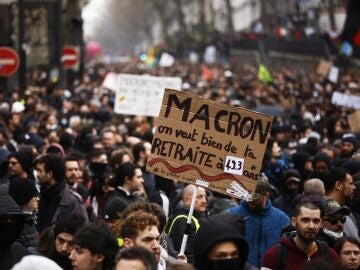
French unions continue this Thursday with its ninth day of mobilizations in just over two months against the pension reform and the first after its controversial adoption by decree defended by President Emmanuel Macron. In it, he delays the retirement age to 64 years compared to the current 62 years. In addition, the unions have charged Macron for, they say, want to discredit the protests.
Police information services anticipate strong participation in the more than 300 demonstrations convened throughout the country, between 600,000 and 800,000 people, and also the presence of radical groups and yellow vestsparticularly in Paris, for which 12,000 agents will be deployed throughout the country, of which 5,000 in the capital.
The demonstrations take place on a day of substantial extension of the strikes that have been taking place more or less uninterruptedly in public transport, in refineries, in energy, in garbage collection or in education. Those that were held this Thursday morning degenerated into riots in some cities, in particular in Rennes, where law enforcement agencies used water cannons and tear gas to disperse some protesters who clashed with the police.
A country almost paralyzed
The strike by air traffic controllers has forced the early cancellation of 30% of flights in the Parisian airport of Orly and 20% in those of Marseille, Toulouse and Lyon. This Thursday they only circulate half trains high-speed (TGV), none of the rest of the long-haul, a third of the regional. And in the vicinity of Paris, depending on the lines, between 50% and 80% have been cancelled.
To this is added a very disturbed situation in the Paris metro, since only the two automatic lines (1 and 14), while in the rest the service schedules are reduced and with many fewer trains than usual
The refineries are, either paralyzed, or with pickets of strikers at the entrance to prevent the release of fuel and, although the Government has imposed the return to work of some employees in strategic deposits, the percentage of gas stations that have remained without some product it does not stop growing.
In the capital there are still thousands of tons of garbage piled up in the streets in some districts due to a collection strike that has been going on for more than two weeks.
Fuel supply, with the strikes at the refineries and the pickets that prevent trucks from leaving some strategic deposits, is becoming in one of the keys of the pulse of the protests in France against the president’s pension reform.
The Ministry of Energy Transition announced this Thursday that “given the supply tensions in certain departments” it has decided to extend 48 hours plus the obligation to return to work of some employees of the warehouses of the port of Fos-sur-Mer, near Marseille.
Macron warms the mood more
Macron’s speech on Wednesday, defending his pension reform and assuming the political price this Wednesday seems to have tempers warmed up, at least of those who are still willing to continue the answer.
The main French union leaders charged this Thursday against the intention they perceive in President Macron to discredit the protests against his pension reform due to the disputes that have occurred in some of them, which they consider marginal.
The general secretaries of the two large centrals, the CDFT and the CGTdenounced in statements at the beginning of the demonstration in Paris the comparisons Macron made on Wednesday between the acts of violence in recent days in France, with the assaults of the extreme right in Brazil and the United States.
“It’s a provocation”stressed the leader of the General Confederation of Labor (CGT), Philippe Martínez, who made an effort to minimize the possibility that the unions would be overwhelmed by extremist groups and spontaneous demonstrations: “What is not organized is very marginal”.
The head of the French Democratic Confederation of Labor (CFDT), Laurent Berger, also complained about these comparisons by the head of state, after repeating that he and his union always condemn any violent action against property and people.
Source: Lasexta
Ricardo is a renowned author and journalist, known for his exceptional writing on top-news stories. He currently works as a writer at the 247 News Agency, where he is known for his ability to deliver breaking news and insightful analysis on the most pressing issues of the day.











